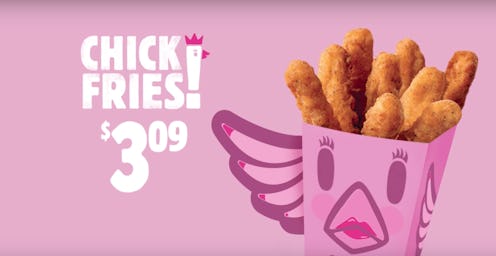Life
Burger King Just Launched "Chick Fries" To Shed Light On The Pink Tax
As if Burger King’s Chicken Fries weren’t taking on enough as it is—French fries and chicken nuggets? We get it, you’re busy—now they’re tackling gender-based price discrimination. In a video released today, Burger King’s new “Chick Fries” campaign answers the question that’s undoubtedly been on everyone’s mind: are Chicken Fries are feminist?
“Chick Fries” are just like your typical Chicken Fries except they come in a pink box, decorated with a chicken that has eyelashes (so you know the chicken is a lady), and costs $1.40 more than the non-pink version. Chicken AND Fries AND Pink for the low, low price of more money than you were paying before? What a deal!
Rest assured, in reality the "Chick Fries" are now retailing for the same $1.69 as their Chicken Friends brethren — the ad, of course, is a commentary on the “Pink Tax”, which is the colloquial term for price hikes on products marketed toward women, the packaging of which is often pink. Get it? Because it’s for girls and “girls like pink sh*t” as Burger King’s “Chick Fries” campaign video points out. Everything from razors to deodorant to other non-gender specific self-care items are included in the list of products women consistently pay more for. According to a video on the Pink Tax from Glamour, which includes data from analysts in California, this hike in pricing costs women an average of $1351 a year.
“On average the female version costs more 42 percent of the time,” according to a press release from Burger King shared with Bustle over email. “Burger King is releasing a film that captures real reactions to “Chick Fries,” Chicken Fries in a pink box that cost 83% more.”
The video shows female customers receiving their “Chick Fries” in a pink box and being told their total will be higher due to the “adorable” pink packaging. The video is a goldmine of reaction GIFs with people staring disapprovingly and stating with their eyes and words that they “don’t give a f*ck that the box is pink.” One woman, after being told by the person posing as a Burger King employee not to “get excited” by the upcharge, replied, “Do I look excited?”
“Burger King restaurants welcome everyone, and we see pink tax as extremely unfair,” said Christopher Finazzo, president of Burger King North America, in a statement, according to USA Today. “We created this experiment with fan-favorite Chicken Fries to demonstrate the effect of pink tax and how everyone should pay the same for the same products—whether it’s pink or not.”
Burger King’s Chick Fries will be available starting today in select restaurants in five major cities: NYC, Los Angeles, San Francisco, Miami, and Chicago. However, Chick Fries will be available for the same price as regular, non-pink Chicken Fries. You can pick up your pink box in one of the aforementioned cities for $1.69 while supplies last.
This isn’t Burger King’s first foray into socially conscious marketing campaigns. In 2017, Burger King released an anti-bully PSA which showed customers responding to bullying in two different scenarios: a high schooler getting bullied at a restaurant and a customer’s Whopper Jr. sandwich being punched and taken apart (“bullied,” if you will). While 95 percent of customers complained about their pulverized sandwich, just 12 percent reported the high school student being bullied.
Earlier this year, Burger King released an ad about net neutrality explaining the often complicated topic through a perhaps more understandable medium: wait time to get a fast food burger. If customers paid significantly more, they could get their Whopper quicker. If they opted to pay the regular price, they’d have to endure a longer wait time.
When it comes to feminist-focused advertising campaigns (or any marketing campaign doing advertising gymnastics to tie itself to a social cause), a healthy dose of skepticism is necessary.
However, Burger King’s new Chick Fries ad does include a call-for-action at the end, telling people to go to CallMyCongress.com to take action against the Pink Tax. In April, California Congressperson Jackie Speier introduced a Pink Tax repeal act as an effort to end gender-based pricing discrimination. In a statement, Representative Speier spoke about how the Pink Tax compounds with the wage gap to put women at a double financial disadvantage. The economic imbalance affects women of color, in particular.
Regardless of whether the ad makes you want to buy chicken in the shape of fries, perhaps it will move more people to contact their reps.
